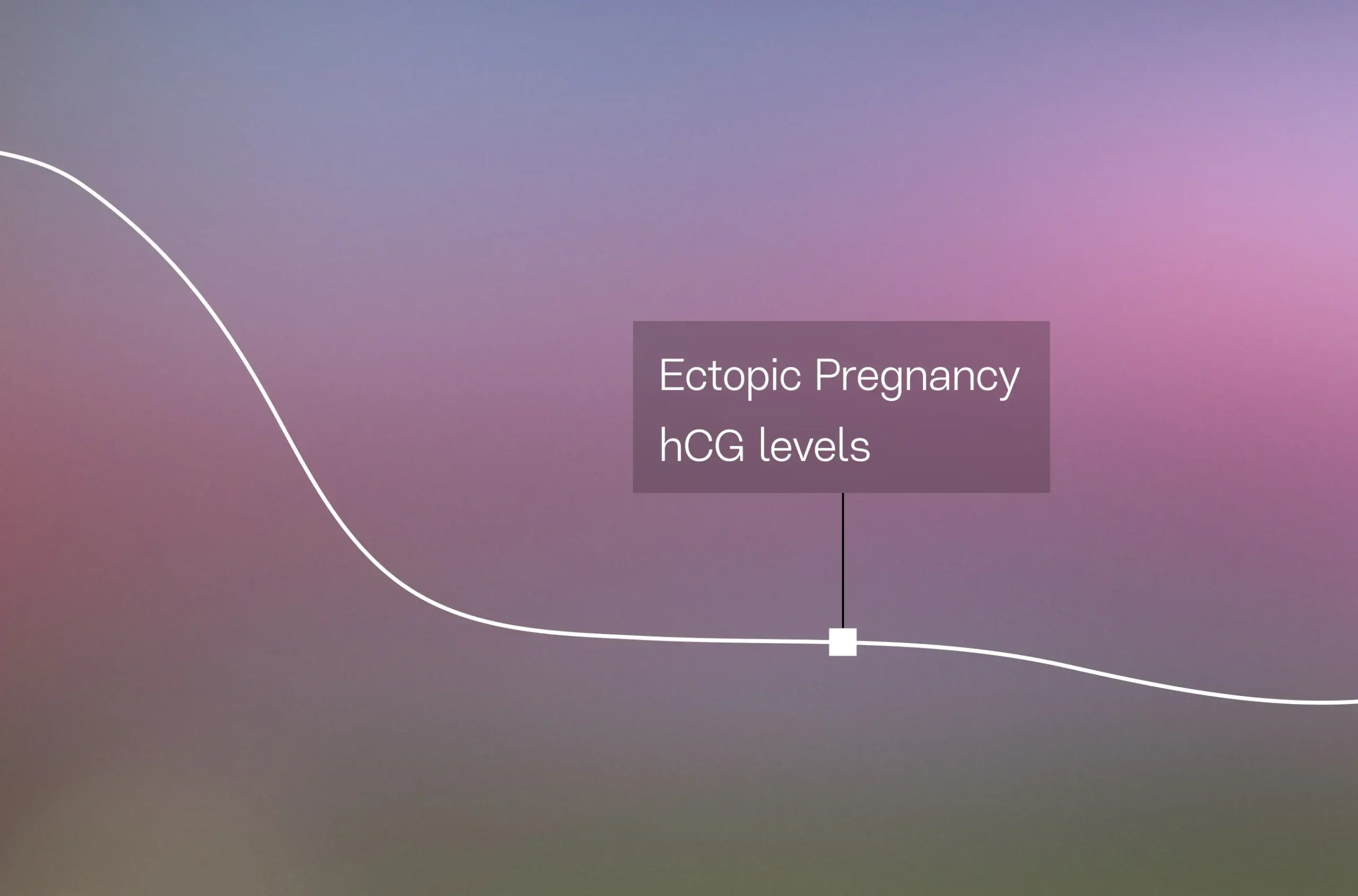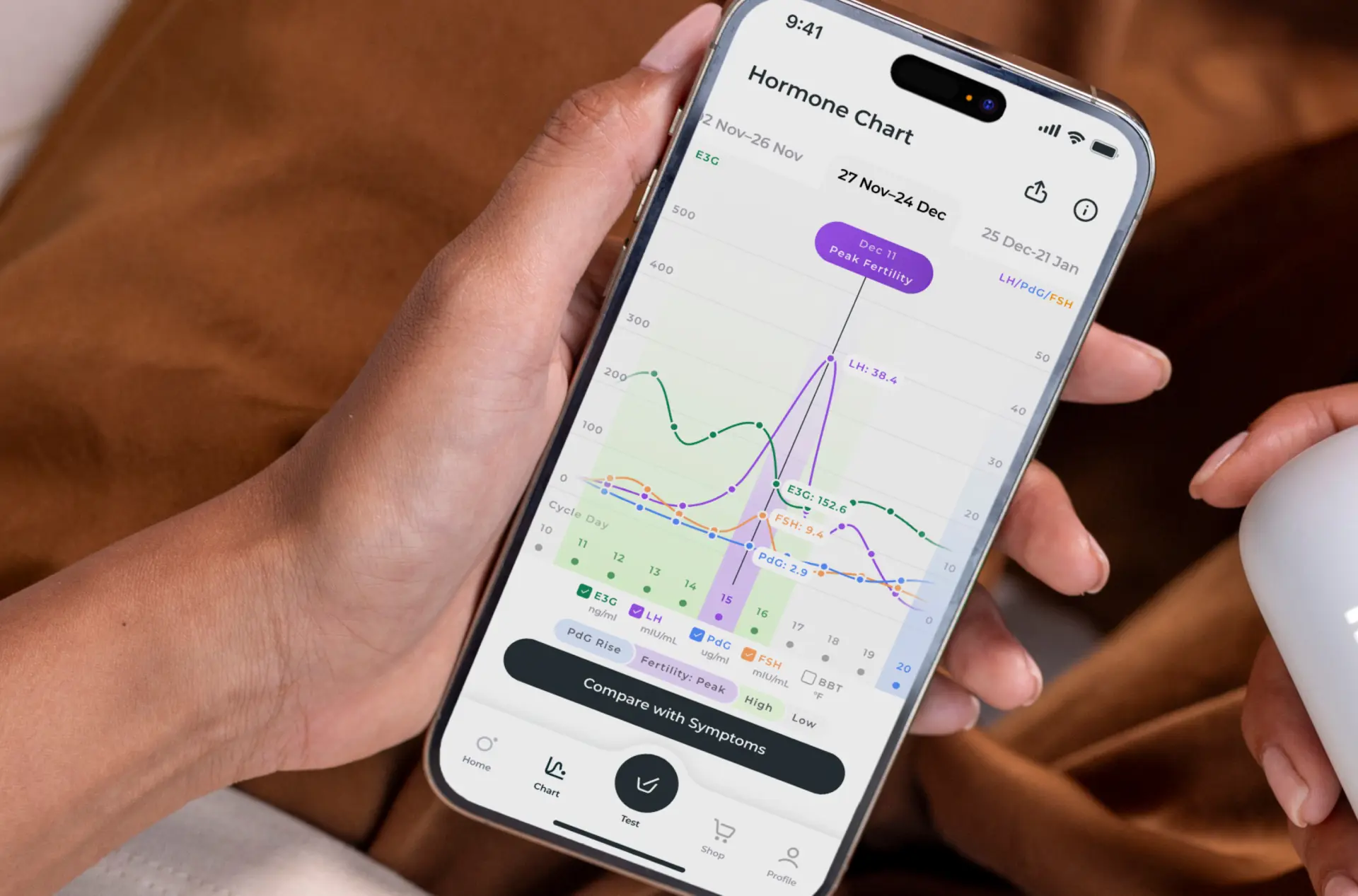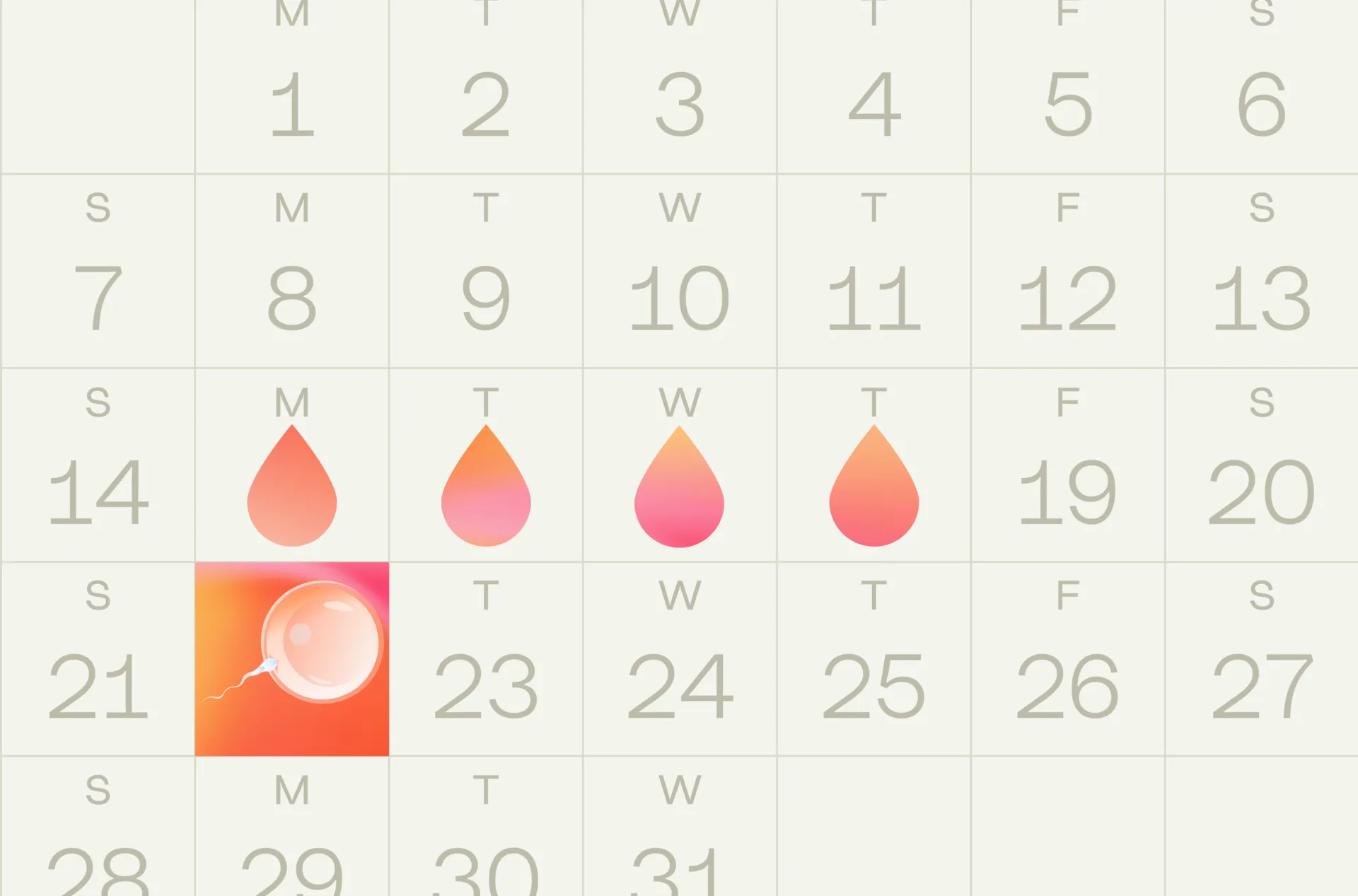Content table
When you hope to become a parent, a positive pregnancy test can bring so much excitement.
But even with that positive test, your body might send signals that something isn’t quite on the right path. This is especially true when talking about an ectopic pregnancy.
An ectopic pregnancy is one that doesn’t grow where it’s supposed to. Instead of settling safely inside the uterus, the fertilized egg starts to develop somewhere else. This often happens in the fallopian tubes and affects about 1-2% of all pregnancies in the U.S.
Want to know one of the key ways that doctors can tell if a pregnancy is growing as it should or if there is a concern? By watching your hCG levels.
Let’s get the low-down on what your hCG levels can tell you. We’ll also discuss why knowing about ectopic pregnancy hCG levels is so vital.
Key Takeaways
- hCG levels in an ectopic pregnancy often look different from those in a normal pregnancy. They are usually lower and rise more slowly.
- A positive pregnancy test can’t tell you if it’s an ectopic pregnancy. This diagnosis requires special tests like an ultrasound.
- The way your hCG levels change over time is more important than one single number. The key is how fast they rise.
- Ectopic pregnancies are serious and need quick medical attention to prevent problems.
- If you have pelvic pain, vaginal bleeding, or feel unless with a positive test, talk to a doctor right away.
Normal hCG Levels in Pregnancy
When you get a positive pregnancy test, it means your body is making a hormone called Human Chorionic Gonadotropin (hCG). This special hormone is made by the cells that will eventually form the placenta.
hCG is super important, especially in the first few months of pregnancy. It helps keep the pregnancy going strong. It tells your body to continue making progesterone, another key hormone for pregnancy.
Normal hCG levels can range widely and look very different from one person to another. So, trying to compare your exact number to someone else’s isn’t the best way to understand your body.
Here’s a general idea of what hCG blood levels might look like during the first few weeks of a healthy pregnancy.
Week # | hCG Blood Levels (mIU/mL) |
3 | 5-72 |
4 | 10-708 |
5 | 217-8,245 |
6 | 152 – 32,177 |
7 | 4,059 – 153,767 |
8 | 31,366 – 149,094 |
9 | 59,109 – 135,901 |
10 | 44,186 – 170,409 |
You can see that the numbers have a broad range. Generally, hCG levels tend to reach their highest point around week 10 of pregnancy. After that, they might stay about the same or even start to go down a bit. These levels can range anywhere from 20,000 to 200,000 IU/L.
The most important thing for doctors isn’t just one single hCG level number. What matters is how quickly that number goes up over time.
At What Rate Do hCG Levels Normally Rise?
In a normal pregnancy, hCG values are supposed to double every 48 hours. (That’s during the first 7 or 8 weeks.)
This period is called hCG doubling time.
This “doubling every 48 hours” is a common guideline that doctors use. However, it’s not always exactly like that in real life. In about 15% of women, hCG levels might increase by about 66% over two days instead of fully doubling.
But guess what? These women can still go on to have healthy, viable pregnancies.
So, if your hCG values are going up by at least 66% every two days, that’s generally a good sign.
Know more: hCG Doubling in Pregnancy: Why It Matters
What Is an Ectopic Pregnancy?
An ectopic pregnancy occurs when an embryo tries to grow outside of the uterus. The most common place for this to happen is in the fallopian tubes. These tubes are what carry the egg from the ovary to the uterus.
About 97% of ectopic pregnancies happen in the fallopian tubes (also called a tubal pregnancy, or tubal ectopic pregnancy).
But sometimes, the fertilized egg can implant in other places, like the cervix, ovaries, abdomen, and even in scars from a previous C-section.
Sometimes you might see a positive pregnancy test, but if doctors can’t see the pregnancy on the ultrasound yet, it’s called a “pregnancy of unknown location.”
Most of the time, an ectopic pregnancy diagnosis happens between 6 and 10 weeks of pregnancy.
An ectopic pregnancy cannot be safely carried to term. It’s a serious medical condition that needs immediate attention. This is because only the uterus is built to stretch and grow with a baby. If the embryo tries to grow somewhere else, it can lead to severe internal bleeding, infection, or even a life-threatening situation.
hCG Levels in Ectopic Pregnancy vs. Normal Pregnancy
In an ectopic pregnancy, the hCG levels tend to be lower and rise slower. This is a key difference that doctors look for.
However, it’s important to understand that one single blood test for serum β hCG can’t tell your doctor where the pregnancy is located. This is because there can be a lot of overlap in hCG values in normal vs. ectopic pregnancy.
TLDR: Some normal pregnancy hCG levels might look similar to some ectopic pregnancy levels at one moment in time.
That’s why looking at the way your hCG levels change over time is much more important. The trend of the levels says more than just one number.
If your hCG levels are increasing by less than 66% over 48 hours, it’s often a sign that the pregnancy might be abnormal.
This kind of “subnormal” increase in β hCG is seen in about 85% of ectopic pregnancies.
A study looked at pregnancies after fertility treatments. It explored how early serum β hCG levels related to their outcomes. Very high serum β hCG levels usually mean a healthy, strong pregnancy. This study found that those high levels led to:
- Decreased chemical pregnancies
- More twin or multiple pregnancies
- Fewer ectopic pregnancy rates
This shows how the early hCG levels can give clues about how the pregnancy is developing.
One case report shared the hCG trend for a woman who had an ectopic pregnancy over two months. Her serum hCG levels were checked every 48 hours at first and then once a week.
This regular checking helped her doctors see that her levels weren’t dropping dramatically. But, they weren’t rising as they should have either. This kind of close monitoring helps diagnose ectopic pregnancy.
Can You Detect an Ectopic Pregnancy Through a Pregnancy Test?
No.
You cannot detect an ectopic pregnancy through a pregnancy test.
Home pregnancy tests are what we call “qualitative” tests. This means they can only tell you if the hCG hormone is present in your body or not.
They give you a “yes” (positive) or “no” (negative) answer. An ectopic pregnancy still produces hCG. It’s just not always in the same way as a normal pregnancy. But it will still lead to a positive pregnancy test result.
So, even if you have a suspected ectopic pregnancy, your home pregnancy test will still show positive. It might not be a high hCG level, but it’ll be positive. It’s unlikely to have a negative ectopic pregnancy test and still have an ectopic pregnancy.
An ectopic pregnancy diagnosis can only be made through an ultrasound.
Risk Factors for Ectopic Pregnancy
Anyone can experience an ectopic pregnancy. But some things that can increase your risk of ectopic pregnancy.
One of the most significant risk factors is having a previous ectopic pregnancy. If you’ve had one before, your chances of having a recurrent ectopic pregnancy are higher.
Other things that can increase your ectopic pregnancy risk include:
- Pelvic inflammatory disease: This is an infection of the female reproductive organs, often caused by STIs. Pelvic Inflammatory Disease (PID) can cause scarring of the fallopian tubes, making it harder for the fertilized egg to travel to the uterus.
- Previous tubal surgery: This can include having your tubes tied or surgery to fix them.
- Smoking
- Certain types of birth control: Though rare, this can happen with some types of birth control, like an IUD.
- Fertility treatments: In vitro fertilization and other fertility treatments can slightly increase the risk.
Be sure to discuss any of these risk factors with your doctor, especially if you have a suspected ectopic pregnancy.
How Can I Make Sure My hCG Levels Are Normal?
You’re likely wondering if there’s anything you can do to make sure your hCG levels are normal. The honest truth? There’s no way to ensure this.
The issue here isn’t about you trying to increase your hCG levels yourself. Instead, if your hCG levels aren’t rising as expected, it’s a sign that there might be an underlying problem with the pregnancy itself.
Your doctor will need to investigate to find out why your levels aren’t rising properly, and then you can address that underlying problem.
If you’re concerned about your hCG levels or if you’re experiencing any symptoms that make you think you might have an ectopic pregnancy, talk to your doctor right away.

FAQs
Yes, an ectopic pregnancy will almost always give you a positive pregnancy test.
This is because even when the fertilized egg implants outside the uterus, your body still produces hCG.
However, while the test can tell you if hCG is present, it can’t tell you where the pregnancy is growing.
So a positive test means you’re pregnant, but doesn’t rule out an ectopic pregnancy. You would need further tests, like an ultrasound, to find the location of the pregnancy.
In a normal pregnancy, hCG levels are expected to rise pretty quickly in the early weeks.
The general rule that doctors look for is that hCG values are supposed to double every 48 hours during the first 6 to 7 weeks of pregnancy.
This quick increase is a good sign that the pregnancy is developing properly. However, it’s good to know that sometimes they might increase by about 66% over time and still be totally fine.
After a pregnancy ends, hCG levels will start to drop depending on how high your hCG levels were to begin with.
Generally, it can take anywhere from 7-60 days for hCG to become undetectable.
hCG levels are meant to steadily rise in early pregnancy. But they can sometimes have small ups and downs or not increase perfectly consistently, even in a healthy pregnancy.
However, major or repeated drops can be a sign that something isn’t quite right. The same is true for levels that rise more slowly than expected.
This is why doctors look at the trend of your hCG levels over a few days rather than just one single measurement.
Some healthy pregnancies might see an increase of about 66% in 48 hours. But if the rise is significantly slower than that, it can be a sign of an abnormal pregnancy.
This could point towards an ectopic pregnancy, a miscarriage, or another issue. Your doctor will order more tests to understand what’s happening.
It’s very rare for hCG levels to rise if you’re not pregnant.
However, in extremely rare cases, certain medical conditions or even some types of tumors can produce hCG. This can lead to a positive result even when you’re not pregnant.
Some medications that contain hCG (like certain fertility treatments) can also cause a temporary rise in levels.
Was this article helpful?
Chorionic Gonadotropin Beta Subunit
Diagnosis and treatment of ectopic pregnancy
Predictive value of serum β-human chorionic gonadotropin for early pregnancy outcomes
The use of transvaginal ultrasonography in the diagnosis of ectopic pregnancy
About Pelvic Inflammatory Disease (PID)
Single-dose methotrexate for treatment of ectopic pregnancy
Heterotopic pregnancy: A diagnosis we should suspect more often












